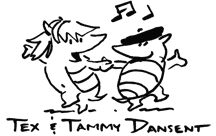2 – Me voici!
Grammaire: 2.2 – Les verbes réguliers en -er
Regular -er verbs
Formation:
To conjugate regular -er verbs in the present tense:
- Drop the -er from the infinitive to form the stem.
- Add the –er endings to the stem:
The endings given below (-e, –es, -e, -ons, -ez, -ent) are for forming the present tense.
The endings (-e, -es, -e, and –ent) are all silent. The only endings that are pronounced are the nous (-ons) and the vous (-ez) endings.
The four silent endings form a boot shape in the verb conjugation.
| parler ‘to speak’ | |
| je parle ‘I speak’ | nous parlons ‘we speak’ |
| tu parles ‘you (sg.) speak’ | vous parlez ‘you (pl.) speak’ |
| elle/il/eil/on parle ‘she/he/they/it speaks’ | elles/ils/eils parlent ‘they speak’ |
Listen carefully to the following sentences. Note that the pronunciation of each of the verbs is the same even though the conjugations are spelled differently.
| Tex, il parle français? Mais c’est un tatou. | Tex speaks French? But he’s an armadillo. |
| Tex: Bien sûr je parle français etTammy, elle aussi, elle parle français. | Tex: Of course, I speak French and Tammy,too, she speaks French. |
| Eh bien dis donc, même les tatous parlent français au Texas? | Well, I’ll be, even the armadillos speak French in Texas? |
List of common -er verbs:
| adorer | to adore |
| aimer | to like |
| aimer mieux | to prefer |
| chanter | to sing |
| chercher | to look for |
| danser | to dance |
| demander | to ask |
| détester | to hate, to detest |
| donner | to give |
| écouter | to listen |
| étudier | to study |
| habiter | to live |
| jouer | to play |
| montrer | to show |
| présenter | to introduce |
| regarder | to watch |
| rencontrer | to meet (by chance) |
| rester | to stay, remain |
| téléphoner | to telephone |
| travailler | to work |
| trouver | to find |
Attention:
Do not forget that élision and liaison pronunciation rules apply here!
- Élision: Je changes to j’ before a verb starting with a vowel or a silent h (ex. j‘adore, j‘habite)
| Tex: J‘adore la musique rap et j‘écoute souvent de la musique dans les clubs. | I love rap music and I often listen to music in clubs. |
- Liaison: The s in plural pronouns (nous, vous, and ils/elles) is usually silent except when it is followed by a verb that begins with a vowel sound. In such a case the silent s is pronounced as a /z/ and links the pronoun to the verb.
| Tex et Tammy, ils écoutent de la musique cadienne avec Paw-Paw! | Tex and Tammy, they listen to Cajun music with Paw-Paw! |
| Tammy: Nous adorons danser. | Tammy: We love to dance. |


Listening Comprehension:
1
2
3
4
5
6
7
8
9
10
11
12

